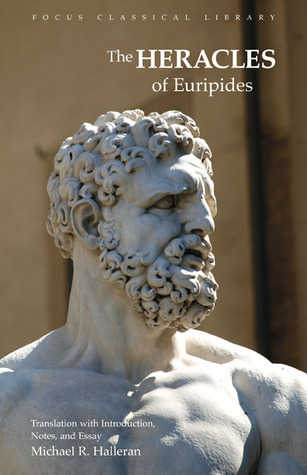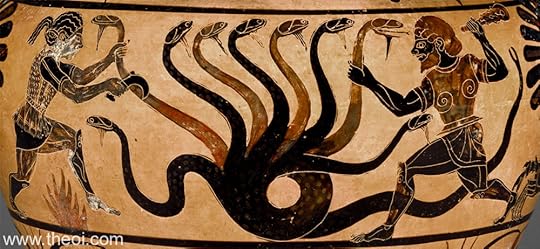What do you think?
Rate this book


96 pages, Paperback
First published January 1, 417
Homer and Hesiod have attributed to the gods all things
That among men are sources of blame and censure:
Thieving, committing adultery, and deceiving each other.
But mortals think that gods are born
And have clothing, voice, and bodily frame just like theirs.
But if oxen, or lions had hands
Or could draw with their hands and create works like men,
Then horses would draw the shapes of gods like horses, and oxen like oxen,
And they would make the same kinds of bodies
As each one possessed its own bodily frame.


Now it came to pass that after the battle with the Minyans Hercules was driven mad through the jealousy of Hera and flung his own children, whom he had by Megara, and two children of Iphicles into the fire; wherefore he condemned himself to exile, and was purified by Thespius, and repairing to Delphi he inquired of the god where he should dwell. The Pythian priestess then first called him Hercules, for hitherto he was called Alcides. And she told him to dwell in Tiryns, serving Eurystheus for twelve years and to perform the ten labours imposed on him, and so, she said, when the tasks were accomplished, he would be immortal. (Apollodorus, Bibliotheka II.4.12 (Frazer, trans.))Euripides, accused by some (with some justice perhaps) of being an atheist, reverses the chronology here by having the twelve labors completed before the murders of Megara and their children, as Heracles enters the text to his still living family and has “brought the triple-headed dog” (l. 611), Cerberus of Hades, which is generally accounted the 12th labor (Bibliotheka II.5.12). Normally, the labors were conceived as part of the atonement for the crime, but here, the crime occurs after the labors are finished. It’s a nice setup for some anti-traditionalist views, such as Lycus’ suggestion that overcoming the Lernean Hydra and the Nemean Lion is overstated (l. 151 ff.) or that “his reputation fighting beasts” (l. 158) with a bow is nothing compared to real warfare as part of a phalanx of hoplites. Heracles' quasi-father Amphitryon articulates the contrary view that fighting in a phalanx is not so big a deal, and that Heracles is slick for using a bow & arrow: “This is best in war: to preserve yourself and to hurt your foe” (l. 201).
He thought Eurystheus’ fatherThough killing one's own minor children is awful, if it is your enemy’s children, killing them is of course perfectly reasonable and acceptable. Insofar as this is a treatise on natalism, he will later place his own children into juxtaposition with the chthonic beasts that he purged from the earth: “And now my last worst labor has been done: / I slew my children and crowned my house with grief” (ll. 1279-80)--parenting as the ne plus ultra of heraclean labors (this appears in the labors of Theseus, too—it has been pointed out to me that the Minotaur is the ultimate presentation of a difficult child).
Had come, trembling, to supplicate his hand; pushed him away, and set his bows and arrows
Against his sons. He thought he was killing
Eurystheus’ children. Trembling with terror,
They rushed here and there; one hid beneath
His mother’s robes, one ran to the shadow.
(ll. 967-72)
all this has no bearing on my grief;So, there it is, the great hero as anti-theist ideological weapon.
But I do not believe the gods commit
Adultery, or bind each other in chains.
I never did believe it; I never shall;
Nor that one god is a tyrant of the rest.
If god is truly god, he is perfect,
Lacking nothing. These are poets’ wretched lies.
(ll. 134046)
"What groaning,
what lament,
what song of death,
what dance of Hades
shall I do?"
"Who else should I defend if not wife,
sons, father? Farewell my labors!
That was all pointless.
I should have been here.
How is it heroic
to fight hydras and lions for Eurystheus,
while my children face death alone?
I shall never be called "Herakles the victor" again."
"What are you saying? What have I done? Father!”
"AIAI [cry]
My world goes dark."
"Here is my life — not worth living
now or ever.
First, I came into being from this sort of man:
he killed my mother’s father
then married her to deflect the guilt.
When the family foundations are poor
of course the descendants turn out a disaster.
And Zeus—whoever Zeus is!— begot me
(don’t be offended, old man. I consider you
my father now, not Zeus)
as an enemy for Hera.
While I was still an infant
she put snakes in my cradle, that wife of Zeus,
to annihilate me.
And when I grew up — all these labors,
what can I say? Those lions.
Those typhons.
Those giants.
Those centaurs.
Those wars.
Then the hydra with her hundred heads snapping.
And down to hell to get the threeheaded dog.
And now, absolutely last labor.
I kill my children.
I finish my house in evil."
"O bitter last kiss.
Oh bitter weapons. My partners.
Should I take you with me or leave you behind?
Knocking against my ribs you will always be saying,
"This is how you slew your wife and sons,
we are your childkillers."
Can I bear that?
Can I answer?
But without them
won’t I die in shame at my enemies’ hands—
naked, nobody?
I cannot leave them.
However grotesque it is.
I must keep my weapons."
Herakles: "I fear to stain your clothes with blood."
Theseus: "Stain them. I don’t care."
THESEUS
Is this the all-heroic Heracles talking?
HERAKLES
Not all-heroic. There has to be some limit to pain.